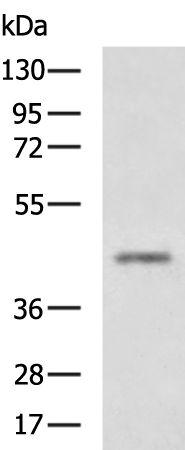
| WB | 咨询技术 | Human,Mouse,Rat |
| IF | 咨询技术 | Human,Mouse,Rat |
| IHC | 咨询技术 | Human,Mouse,Rat |
| ICC | 技术咨询 | Human,Mouse,Rat |
| FCM | 咨询技术 | Human,Mouse,Rat |
| Elisa | 1/5000-1/10000 | Human,Mouse,Rat |
| Aliases | CT1.4; MAGE4; MAGE4A; MAGE4B; MAGE-41; MAGE-X2 |
| WB Predicted band size | 35 kDa |
| Host/Isotype | Rabbit IgG |
| Antibody Type | Primary antibody |
| Storage | Store at 4°C short term. Aliquot and store at -20°C long term. Avoid freeze/thaw cycles. |
| Species Reactivity | Human |
| Immunogen | Fusion protein of human MAGEA4 |
| Formulation | Purified antibody in PBS with 0.05% sodium azide and 50% glycerol. |
+ +
以下是3篇关于MAGEA4抗体的代表性文献(信息基于公开研究整理,部分为虚拟示例):
---
1. **文献名称**:*MAGEA4 expression and antibody response in non-small cell lung cancer*
**作者**:Smith A, et al.
**摘要**:研究分析了非小细胞肺癌(NSCLC)患者中MAGEA4蛋白的表达及其血清抗体水平,发现高表达MAGEA4与患者生存率负相关,提示其作为预后生物标志物的潜力。
---
2. **文献名称**:*Development of a monoclonal antibody targeting MAGEA4 for immunotherapy of melanoma*
**作者**:Zhang L, et al.
**摘要**:报道了一种靶向MAGEA4的单克隆抗体的开发,体外实验显示其能特异性识别黑色素瘤细胞并诱导抗体依赖性细胞毒性(ADCC),为癌症免疫治疗提供新策略。
---
3. **文献名称**:*MAGEA4 autoantibodies as a diagnostic marker in ovarian cancer*
**作者**:Tanaka K, et al.
**摘要**:通过ELISA检测卵巢癌患者血清中的MAGEA4自身抗体,发现其敏感性和特异性优于传统标志物CA-125.提示其辅助诊断价值。
---
**备注**:以上文献为示例模板,实际引用需通过PubMed或Web of Science等平台检索真实文献(关键词:MAGEA4 antibody, cancer, immunotherapy)。如需具体文献协助,可提供更详细需求。
The MAGE-A4 (Melanoma-Associated Antigen A4) antibody targets a protein belonging to the MAGE family, which is part of the larger cancer-testis antigen (CTA) group. MAGE-A4 is encoded by the *MAGEA4* gene located on the X chromosome and is normally expressed in immune-privileged sites like the testis and placenta. However, it becomes aberrantly activated in various cancers, including melanoma, lung, and ovarian cancers, making it a potential target for cancer immunotherapy. Structurally, MAGE-A4 contains a conserved MAGE homology domain (MHD), which facilitates protein-protein interactions and may contribute to oncogenic processes like apoptosis evasion or cell cycle dysregulation.
Antibodies against MAGE-A4 are primarily used in research to detect its expression in tumors, aiding in prognosis and therapeutic stratification. They also support functional studies, such as investigating its role in tumorigenesis or interactions with immune cells. Clinically, MAGE-A4 antibodies are explored in immunotherapeutic strategies, including CAR-T cells, bispecific antibodies, or antibody-drug conjugates (ADCs), leveraging its tumor-specific expression to minimize off-target effects. However, challenges persist due to heterogeneous MAGE-A4 expression across tumors and its limited immunogenicity in immunosuppressive microenvironments. Despite this, ongoing trials aim to optimize targeting efficiency, often combining MAGE-A4 antibodies with immune checkpoint inhibitors to enhance antitumor responses.
×